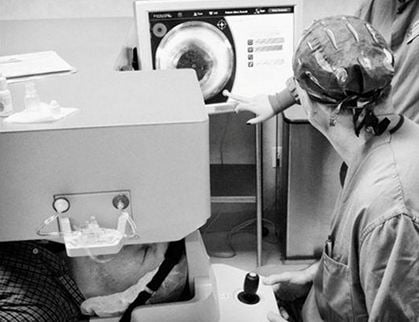Debunking the most common myths and misconceptions surrounding cataracts.
It can be very scary when a vision problem appears and begins to affect the way that we see the world around us. After all, our eyes are what help us envision our surroundings and asses our environments. When we begin to lose this sense that we often rely on for so much, it can seem downright terrifying.
What is often even scarier for some people is the possibility of trying to correct a small vision problem, only for the result to end up much worse than it originally began. This is why some people are hesitant to have surgery to correct things such as poor vision, cataracts or glaucoma. However, each of these surgeries have been praised all across the world as a way to help, and sometimes even reverse, problematic vision problems.

Cataract surgery especially has helped many people who suffer from this common age-related vision problem restore their vision and keep them comfortable in their day-to-day lives. Also, because cataract surgery helps to tackle common cataract symptoms such as double vision, light sensitivity, glare or poor night vision, many people actually found that their quality of life significantly improved post surgery.
To help people get a better understanding of how cataract surgery can be very beneficial for those who suffer from the long-term effects of this common eye disease, today we are debunking some of the most common misconceptions about cataracts.
MYTH: Cataract surgery can only occur once the cataract is fully mature.
Cataract surgery is so advanced in this day and age that the procedure can be performed as soon as it begins interfering with your vision. You no longer have to wait for your cataract to fully mature and run the risk of possible complications or permanent side effects.
MYTH: Cataracts can return again once they are removed.
One of the great things about cataract surgery is that, once the lens is removed from the eye, cataracts can never occur again. Occasionally, a membrane left in the eye after cataract surgery can become cloudy and blur vision. Called a posterior capsular opacification (PCO), this is very easily treated with a quick laser treatment that puts a small laser hole in the cloudy membrane to restore your vision very quickly.
MYTH: Only old people get/need cataract surgery.
While cataracts typically affect people who are in their senior years, no one is too old for cataract surgery. This vision problem can affect anyone from infants to people in their 80s. Age also has no bearing on when you should have surgery to have your cataracts removed. Once a cataract begins interfering with your vision and daily routine, that is the best time to get it removed.
MYTH: Cataract surgery is a difficult procedure to go through,
With the recent changes in cataract surgery technology, the results have never been better or safer. HD Cataract surgery utilizes a laser to make all the incisions for cataract surgery, including incisions to control astigmatism. The laser is also able to soften up the cataract to make it much safer to remove. This leads to better vision without glasses, safer removal of difficult cataracts, and quicker recovery. Dr Silverman is the first eye surgeon in New Jersey to offer HD Cataract surgery with the OptiMedica Catalys Femtosecond laser system!
If you have any more questions about cataracts, cataract surgery or whether or not you would be a good candidate for this procedure, be sure to contact OCLI today.